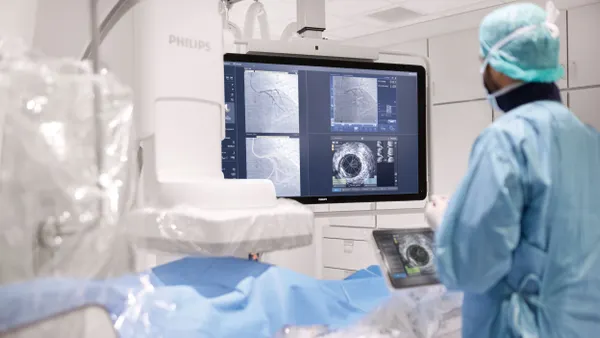Dive Brief:
- Zimmer Biomet's total hip replacement system for its Rosa surgical robot was cleared by the FDA, the company's second expansion of robotics in 2021 after the partial knee replacement system was cleared by the agency in April.
- The 510(k) allows Zimmer to keep pace with rival Stryker's Mako system and will intensify the already growing robotics competition in orthopaedics. Rosa is now cleared to perform total and partial knee replacements, total hip replacements and neurological and spine procedures, although Zimmer will spin off its spine company in the near future.
- CEO Bryan Hanson told investors on a May earnings call that based on experience with the Rosa total knee offering, the hip offering should launch shortly after being cleared and be a significant growth driver in coming years. "We have a lot more experience with Rosa now, so our confidence level to go more to almost an immediate full launch is there," Hanson said. "So, you're going to see a lot less time spent in a limited launch for either partial [knee] or Rosa Hip."
Dive Insight:
Orthopaedics has been one of the hardest-hit medtech segments during the coronavirus pandemic as the procedures were largely deferred due to nationwide shutdowns of elective care. However, robotic system placements for Stryker and Zimmer continued throughout 2020 because hospitals were still willing to spend capital.
The placements fueled the growing orthopaedic robotics competition, and 2021 was set up to be another growth year for the space. Along with the expected partial knee and total hip clearances for Zimmer, Johnson & Johnson's DePuy Synthes received 510(k) clearance for robotic-assisted total knee replacements for their Velys system in January, bringing the medical device giant-backed company into the robotics market.
This year was also expected to boost companies' robotics business as electives returned, although procedure rebounds have been uneven and in some cases halted in regions experiencing surges of patients with COVID-19 due to the delta variant of the coronavirus.
Hanson said during an August earnings call that large joint procedures grew above 2020 levels but still have been slower to return than other procedure types. And while companies made it through the majority of the second quarter before delta fully took hold in the U.S. and other markets, the impact on businesses in the third quarter is hanging over the industry.
"COVID is still very much with us, and we're watching it very closely, as you might imagine," Hanson said. The CEO was optimistic that hospitals can manage COVID-19 surges and the across-the-board shutdown of elective care seen last year could be avoided.
Investors seemed to not be convinced by the CEO's optimism. Zimmer's shares dropped nearly 10% between Aug. 3 and 4, and the stock struggled over the next week before stabilizing a bit.
As demand for Rosa continues, expanding the system's offerings could provide a boost for the company. Stifel analysts wrote in a May report that following a Rosa total hip clearance, "above-market trends should follow over time."
Turning traditional hip procedures into robotic hip procedures could be harder than expected, however, despite Zimmer's optimism of a near-immediate full launch. Hanson told investors in May that while about 20% of patients are not satisfied with traditional knee procedures, which can help drive an increase in robotic procedures, the same cannot be said for patients' satisfaction with hip procedures.
"Because of that, most surgeons don't want to disrupt their flow. They don't want to take more time to do a procedure," Hanson said. "And the key things that we do from a Rosa perspective is to try to keep that surgeon flow, that procedure flow, pretty consistent with what they're used to ... I think that will be a very important differentiator here."












